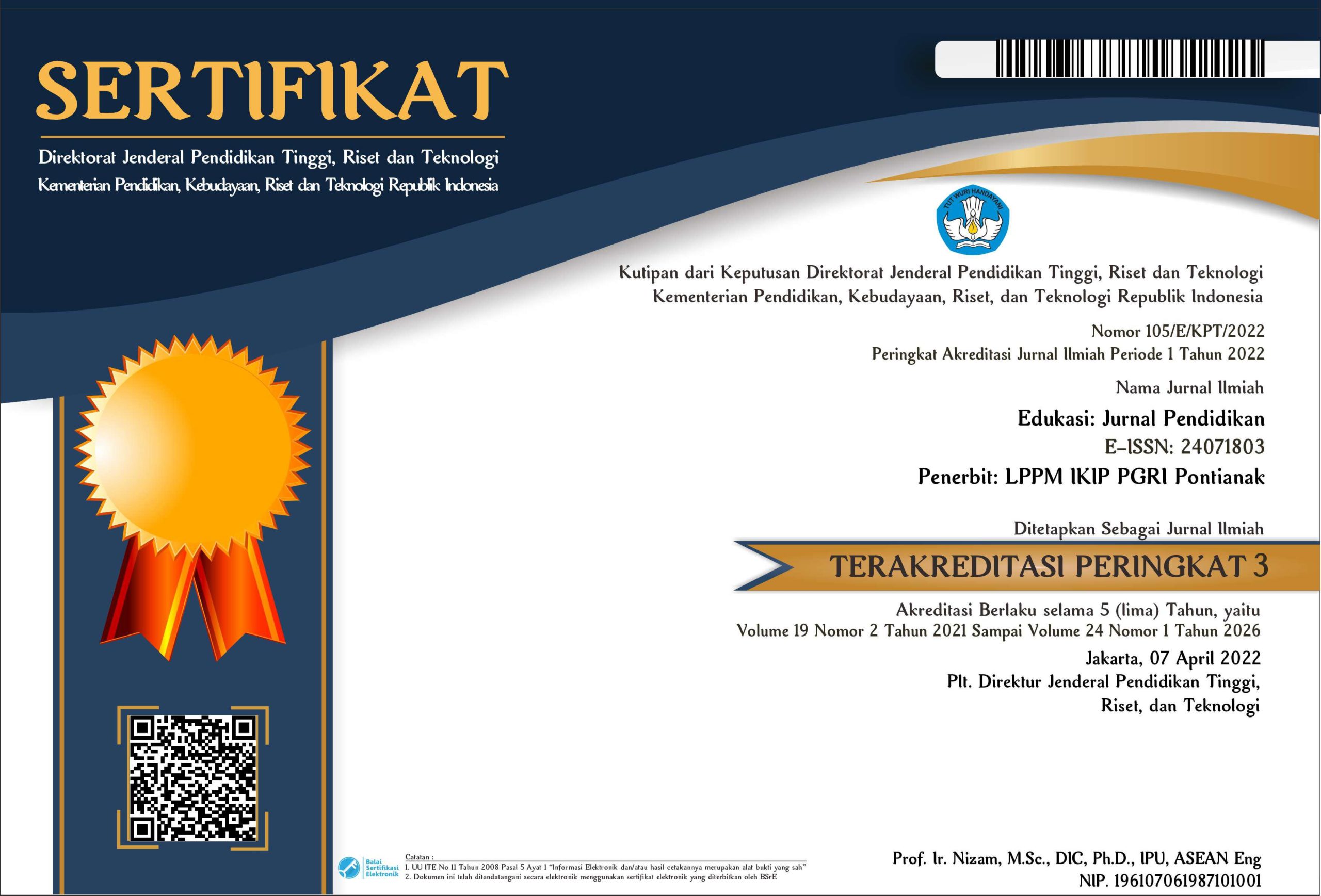Implementation of M-Flex Based Moodle in Pancasila Course: An Initial Evaluation on Student’s View
DOI:
https://doi.org/10.31571/edukasi.v19i2.2930Keywords:
online learning, Moodle, learning strategy, pembelajaran online, strategi pembelajaranAbstract
Abstract
M-Flex is the approach used by utilizing various interesting and quality online learning maneuvers. Moodle-based M-Flex learning specifically in Pancasila learning is the focus of this research. The research aimed to see students' initial responses to Moodle-based M-Flex and monitor any benefits and security felt by users. The approach used is qualitative, with interviews as research instruments. The research respondents were 9 students. Analysis procedures used descriptive qualitative methods. In conclusion, the application of M-Flex based on Moodle still faces several challenges related to students' internet connections, the lack of training in using Moodle for students in Pancasila classes, and the assessment design which is still less varied. M-Flex based on Moodle, on the other hand, shows an advantage because it is supported by Moodle features that continue to develop.
Â
Abstrak
M-Flex adalah pendekatan yang digunakan dengan memanfaatkan berbagai manuver pembelajaran dalam jaringan yang menarik dan berkualitas. Pembelajaran M-Flex berbasis Moodle khusus dalam pembelajaran Pancasila dijadikan fokus dalam penelitian. Tujuan penelitian untuk melihat respons awal mahasiswa terhadap M-Flex berbasis Moodle dan memantau setiap manfaat serta keamanan yang dirasakan oleh penggunanya. Pendekatan yang digunakan adalah kualitatif dengan wawancara sebagai instrumen penelitian. Responden penelitian sebanyak 9 mahasiswa. Prosedur analisis menggunakan metode deskriptif kualitatif. Kesimpulannya penerapan M-Flex berbasis moodle masih menghadapi beberapa tantangan terkait koneksi internet mahasiswa, kurangnya pelatihan penggunaan moodle bagi mahasiswa dalam kelas Pancasila dan rancangan asesmen yang masih kurang variatif. M-Flex berbasis Moodle di sisi lain memperlihatkan keuntungan karena ditunjang fitur moodle yang terus berkembang.
Downloads
References
Amiroh. (2012). Membangun E-learning dengan Learning Management System Moodle. Jakarta: Genta Group Production.
Bork, A. (2012). Tutorial Distance Learning: Rebuilding Our Education System. Amsterdam: Springer Netherlands.
Bowo, A. (2016). Restaurant Choice for Indonesian Gen Y, Gen X and Baby Boomers. 2nd International Conference on Advanced Research in Business and Social Sciences 2016.
Brooks, M. D. (2019). Transforming Literacy Education for Long-Term English Learners: Recognizing Brilliance in the Undervalued. United Kingdom: Taylor & Francis.
Calle-Urgiléz, K. (2018). Virtual Learning Environment for Children with Disabilities: A Proposal Based on MOODLE and Content Management with Over The Top (OTT) Technology. 2018 International Conference on Electronics, Communications and Computers (CONIELECOMP).
Candarli, D. Y., & Yuksel, H. G. (2012). Students’ Perceptions of Video-Conferencing in the Classrooms in Higher Education. Journal Social and Behavioral Sciences, 47(2012), 357-361. https://doi.org/10.1016/j.sbspro.2012.06.663.
Chatib, M., Hidayat, S., & Siroj, R. A. (2019). Penerapan Pembelajaran Kooperatif Tipe Numbered Heads Together (NHT) Berbantuan Aplikasi Moodle untuk Meningkatkan Hasil Belajar Kognitif Peserta Didik di SMA Negeri Titian Teras Jambi. BIODIK, 5(1), 68-80. https://doi.org/10.22437/bio.v5i1.6393.
Dent, C. (2018). Moodle’s Founder and CEO, Martin Dougiamas, Receives an Honorary Doctorate from Université Catholique de Louvain. Retrieved from Moodle: https://moodle.com/news/moodles-founder-ceo-martin-dougiamas-receives-honorary-doctorate-universite-catholique-de-louvain/. Accessed 9 August 2020.
Dvorak, R. (2011). Moodle for Dummies. Canada: Wiley.
Efriana, L. (2020). Problems of Online Learning during Covid-19 Pandemic in EFL Classroom and the Solution. JELITA: Journal of English Language Teaching and Literature, 2(1), 38-47.
Fashant, Z. (2019). Designing Effective Teaching and Significant Learning. Virginia: Sylus Publisher.
Fink, L. (2013). Creating Significant Learning Experiences: An Integrated Approach to Designing College Courses, Revised and Updated. San Francisco: Jossey-Bass.
Giorgi, B. (2020). Transition to Online Education in Schoolds during SARS-CoV-2 Coronavirus (Covid19) Pandemic in Georgia. Pedagogical Research, 5(1), 1-8.
Kohkoc, M. (2019). Flexibility in e-Learning: Modelling its Relation to Behavioural Engagement and Academic Performance. Themes in Learning, 12(1), 1-16.
Meylani, R., Bitter, G., & Legacy, J. (2015). Desirable Characteristics of an Ideal Online Learning Environment. Journal of Educational and Social Research, 5(1), 203-215. https://doi.org/10.5901/jesr.2015.v5n1p203.
Munir. (2012). Teknologi Informasi dan Komunikasi: Pembelajaran Jarak Jauh. Bandung: Alfabeta.
Mustafa, N. (2020). Impact of the 2019–20 Coronavirus Pandemic on Education. International Journal of Health Preferences Research, 4(1) 25-30.
Riyanto, L. D. (2011). Teknologi Informasi Pendidikan. Yogyakarta: Gava Media.
Rohana, R. (2019). Peningkatan Kemampuan Penalaran Matematis Mahasiswa Calon Guru melalui Pembelajaran Reflektif. Infinity Journal, 1(4), 105-119. https://doi.org/10.22460/infinity.v4i1.p105-119.
Downloads
Published
How to Cite
Issue
Section
License
Authors who publish in this journal agree to the following terms:
- Authors retain copyright and grant the journal the right of first publication with the work simultaneously licensed under a Creative Commons Attribution License (CC-BY-NC) that allows others to share the work with an acknowledgment of the work's authorship and initial publication in this journal.
- Authors are able to enter into separate, additional contractual arrangements for the non-exclusive distribution of the journal's published version of the work (e.g., post it to an institutional repository or publish it in a book), with an acknowledgment of its initial publication in this journal.
- Authors are permitted and encouraged to post their work online (e.g., in institutional repositories or on their website) prior to and during the submission process, as it can lead to productive exchanges, as well as earlier and greater citation of published work.

 Download: 166
Download: 166


















